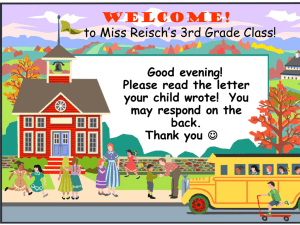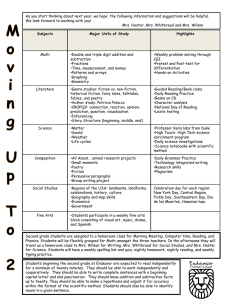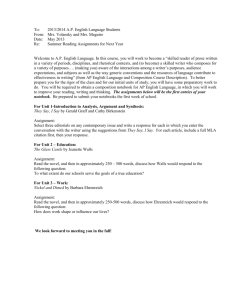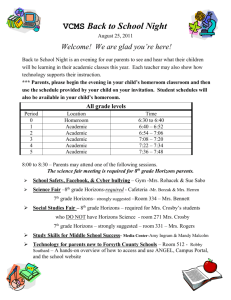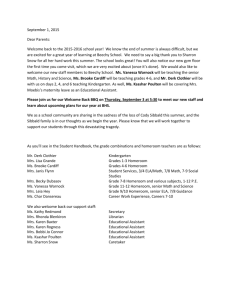Ms. Decker's Third- Grade Class
advertisement
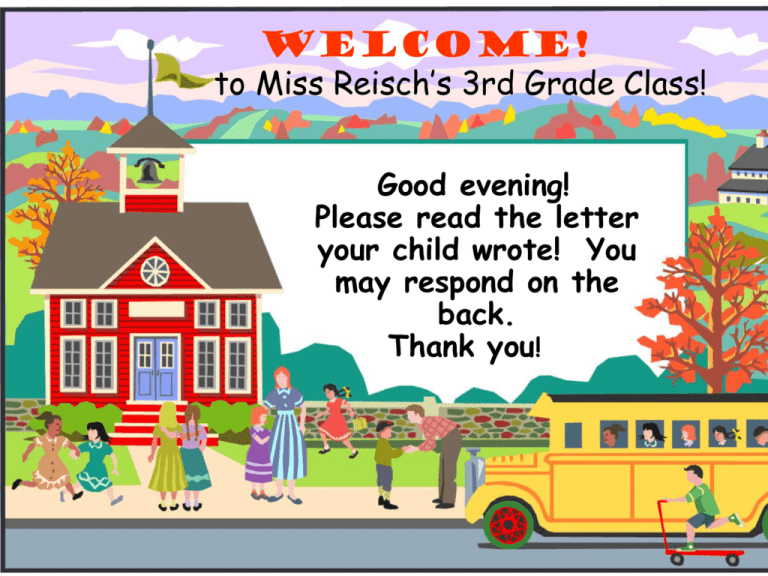
Welcome! to Miss Reisch’s 3rd Grade Class! Good evening! Please read the letter your child wrote! You may respond on the back. Thank you! A little bit about me… My background I grew up locally in Havertown I graduated from Haverford H.S., Bucknell University, and West Chester University Certified in Early Childhood, Elementary, and Reading My experience Working with kids… forever! 11th year here at GVES Goals for 3rd Grade To help students achieve academic and emotional growth To help students develop good “school habits” To provide a supportive and fun classroom environment To encourage students to be lifelong learners and readers To keep students happy and motivated to learn! Classroom Community Our classroom is a safe community for learning. We are a “school family” that knows each other and cares. Student-generated class rules Positive reinforcement - marbles, tickets “Re-teaching” - showing students to do things correctly and focusing on how to do it instead of dwelling on bad choices. Weekly class meetings (Olweus Anti-bullying) Clear expectations Field Trips Longwood Gardens – Social Studies (fall) Theater – Language Arts - play (winter/spring) Virtual Field trip – Plant Growth & Development (spring) Homeroom Odds & Ends Working Snack around 1:00 Birthday Celebrations Lunch Choices - ABC (changes daily) Absences Conferences – math and homeroom Homeroom Parents & sign-ups District Website Homework Homework shouldn’t take more than an hour each night! 100 BC & Math facts nightly HW – going green! Turn in signed newsletter on Fridays Complete most work in notebooks HW log for missing work Sample “typical” hw… Daily Schedule 8:40 - 9:00 Homeroom routine 9:00 – 10:00 LA: word study & guided reading 10:00 – 11:00 Math 11:00 – Lunch 11:30 – Recess 12:00 – 1:00 LA: 100 BC & Writer’s Workshop 1:00 – 2:00 Science / Social Studies 2:00 – 3:00 Specials Science Science Kits Sun, Moon, & Earth Rocks & Minerals Plants Social Studies TCI - Social Studies Alive! 5 units: Map Skills & Geography People & the Community Economics Our Community Global Community Language Arts Some students see other teachers for LA. Please see your schedule. Mrs. Alderfer – Room 235 Mrs. Munro – Room 220 Mrs. Stahler – Room 244 Language Arts 4 Block Model: 1) Independent Reading 2) Writer’s Workshop 3) Guided Reading 4) Word Study 1) Independent Reading 100 Book Challenge Program •Independent reading – strengthens skills… •School Goal: 15 lines per week •1-2 per day + at least 1-2 each night = at least 30 minutes of independent reading per day •Sign each night •After 15 minutes “on level,” students can read additional materials and still record lines Reading at home Just Right books … allows for “active” thinking! 100 BC – Books from students’ independent level Reading aloud Learning to read and reading to learn Talk with your child about what they’re reading What did you notice about the story? Does this book remind you of anything? What have you been wondering as you read? Does this book make you think of anything else you’ve read? What was your favorite part? Why? Were there any parts that surprised you? What are you going to read next? 2) Writer’s Workshop Writer’s Notebooks Whole class projects – across the genres Narrative Informative Persuasive Choice of topics Modeling & valuing the craft of good writing Sharing time – everyone has a story! Goal = Enjoy writing Using technology – flash drives ($7), powerpoint, blabberizer, movie-maker, publishing on word 3) Guided Reading Practicing reading strategies to increase comprehension Modeling what “good readers” do and think Variety of texts – anthology, trade books, nonfiction, choice activities/ books Flexible grouping 4) Word Study Developmental Spelling (Ganske) Spelling stage of development Pattern words – used for 1-2 weeks Assessment (“Writing Sorts”) on Fridays Practiced words, transfer words, “rules” Home component At least two nights a week – sample sort Reinforces in-class activities Time to go to Math! Thank you for coming Feel free to call/email/send a note if you have any additional questions, comments, etc. Math Teachers: Mr. Constable – Rm. 245 Mrs. McGarry – Rm. 246 Mrs. Schmidt – Rm. 236 Ms. Beck – Rm. 237 Welcome, Math Families! Please pick up the green Family Contact Info sheet with your child’s name on it. Feel free to fill it out tonight and leave it for me! Thank you Welcome to Math Introductions… Overview Pace is aimed to be aligned with students’ abilities Problem Solving - hands-on and “real world” whenever possible Continuous reinforcement of topics taught (Daily Common Core Review) Pre-testing & flexible grouping Math Series & Curriculum New math series – Pearson enVision math Fully aligned to the PA Core Standards Emphasizes “Standards of Mathematical Practice” Across all grades Practices and abilities of mathematical thinkers Emphasizes reasoning, problem solving, modeling, and decision making Interactive learning –investigative topic openers Online component Engaging videos Access to tutorials and text resources at home Curriculum Shifts The major shifts in the primary years have been made so that students have time to: fully develop a strong understanding of numbers (numeration and place value) master addition and subtraction facts and concepts develop the ability to compose and decompose shapes (visualization) Homework Reinforcement/practice page & a problem solving page most nights Newsletter Packets with the week’s assignments and an optional bonus (turn in on Friday) Math Facts nightly – school goal = 5 lines/week Meaningful, varied, daily practice Sign off nightly Homework Help rd 3 1. 2. 3. 4. 5. 6. 7. 8. Grade Math Topics Numeration Number SenseAddition/Subtraction Use Place Value to Add and Subtract Meaning of Multiplication Multiplication Facts - Use Patterns Multiplication Facts- Known Facts Meaning of Division Division Facts 9. Understanding Division 10. Fraction Comparison and Equivalence 11. Two-Dimensional Shapes and Attributes 12. Time 13. Perimeter 14. Area 15. Liquid Volume and Mass 16. Data Assessment Tests generally by chapter – announced in advance Some tests are paper and pencil, some may be online. Textbook is available online for studying Please sign and return tests Let’s have a great year together! Feel free to tour the building and visit some of our special area classrooms!
